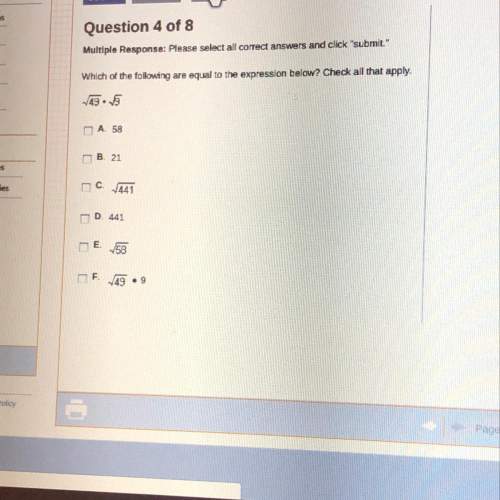
Mathematics, 13.06.2020 21:57, germaine88
Suppose that Y takes on the values {0, 1, 2, 3}, each with probability 1/4. Take a random sample of 5 numbers from this distribution. In how many possible samples can the sum of the five numbers (Y1 + Y2 + Y3 + Y4 + Y5) equal to 1? [Give the number of samples, not the proportion of possible samples]

Answers: 2
Other questions on the subject: Mathematics

Mathematics, 21.06.2019 16:30, jayjay5246
Translate this phrase into an algebraic expression. 21 more than twice goran's savings use the variable g to represent goran's savings. need to know fast.
Answers: 1

Mathematics, 21.06.2019 19:30, karlacr5117
Agarden consists of an apple tree, a pear tree, cauliflowers, and heads of cabbage. there are 40 vegetables in the garden. 24 of them are cauliflowers. what is the ratio of the number of cauliflowers to the number of heads of cabbage?
Answers: 2

Mathematics, 21.06.2019 22:00, fatherbamboo
Liz is shipping a package to her friend. the maximum weight of a medium flat-rate box is 20 pounds, including the box which weighs 6 ounces. write and solve an inequality to describe the possible weight in pounds, w, of the contents that liz will ship to her friend if she must use a medium flat-rate box. use the drop-down menus to explain your answer.
Answers: 2

Mathematics, 21.06.2019 22:00, tatertottheyoungin
If x+y+z=0 what is the value of [tex] {x}^{3} + {y}^{3} + {z}^{3} [/tex]
Answers: 2
Do you know the correct answer?
Suppose that Y takes on the values {0, 1, 2, 3}, each with probability 1/4. Take a random sample of...
Questions in other subjects:


History, 20.09.2020 16:01




Social Studies, 20.09.2020 16:01

Mathematics, 20.09.2020 16:01

Mathematics, 20.09.2020 16:01

Spanish, 20.09.2020 16:01


 implies that all of them are zero but one. The one that is non-zero necessarily is equal to 1. To calculate the number of samples that give this outcome is equivalent to counting the total number of ways in which we can pick the i-index such that
implies that all of them are zero but one. The one that is non-zero necessarily is equal to 1. To calculate the number of samples that give this outcome is equivalent to counting the total number of ways in which we can pick the i-index such that  . Note that in this case we can either choose Y1 to be 1, Y2 to be 1 and so on. So, the total number of samples that give this outcome is 5.
. Note that in this case we can either choose Y1 to be 1, Y2 to be 1 and so on. So, the total number of samples that give this outcome is 5. 




